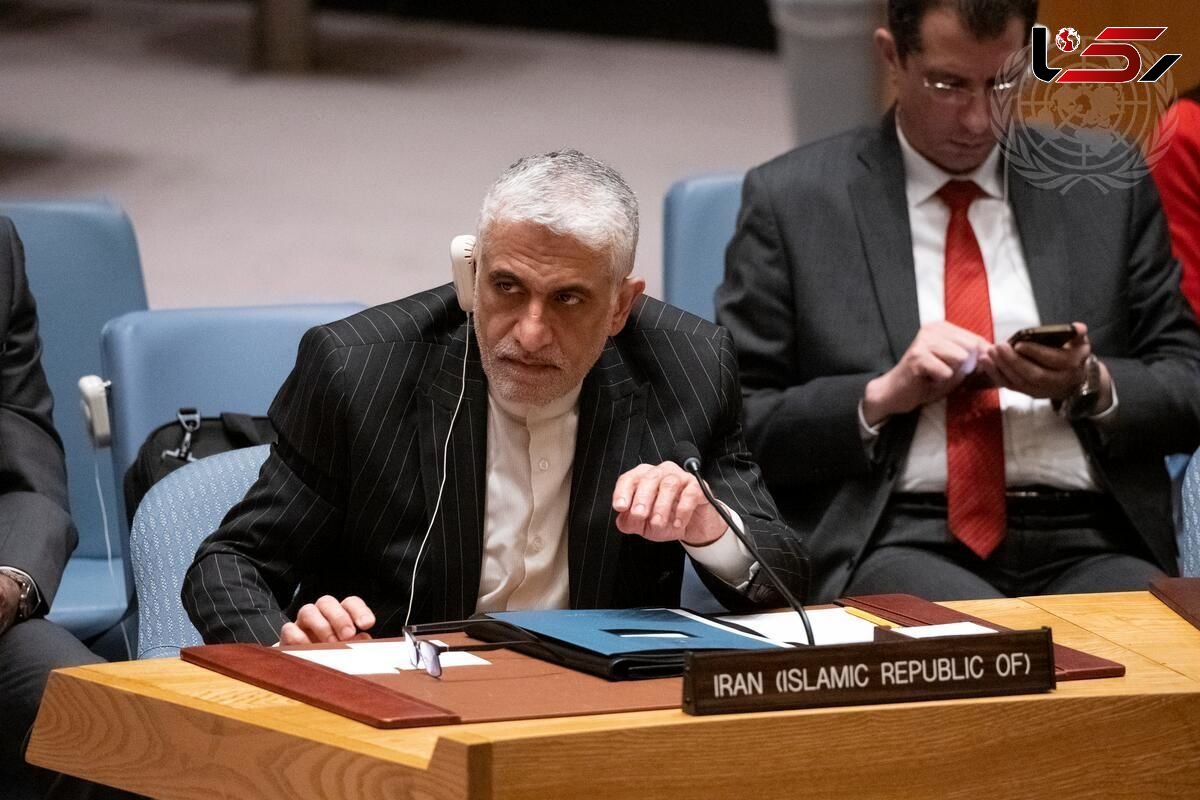Iran’s UN Representative: Nuclear Program Will Not Be Halted by Bombs or Sanctions
Rokna Political Desk: Iran’s Ambassador and Permanent Representative to the United Nations, Amir Saeed Iravani, emphasized that Iran’s nuclear program will neither be destroyed by bombs nor stopped by sanctions, and will continue on its peaceful path. He affirmed that the door to diplomacy remains open.

According to the government’s official news portal, Iravani made these remarks during a meeting of the UN Security Council on the implementation of Resolution 2231 (2015). He expressed gratitude to those council members, including Algeria, Pakistan, China, and Russia, who have rejected coercive measures and upheld the principles of diplomacy, justice, and international law.
He stated: “Their vote today reflects a genuine commitment to diplomacy. It sends a clear message: conflicts must be resolved through dialogue, not through pressure or intimidation. They have chosen to stand on the right side of history.”
Iravani underlined that Iran’s position is clear and steadfast: Resolution 2231 must be implemented exactly as agreed. The timelines it sets forth are not mere recommendations, but binding obligations that were painstakingly negotiated and unanimously approved by the Council. He noted that any attempt by the European trio to reimpose previously lifted sanctions is not only baseless but constitutes a direct attack on international law and the credibility of the UN Security Council.
He continued: “Resolution 2231 and the JCPOA are hard-won achievements resulting from over a decade of negotiations. They addressed all concerns regarding Iran’s nuclear program and confirmed its strictly peaceful nature. Iran has fully and sincerely implemented the agreement. No other country has submitted to such rigorous and intrusive IAEA verification. We have upheld our commitments, unlike the United States, the Troika, and the European Union.”
Iravani recalled that it was the United States that unilaterally withdrew from the JCPOA in 2018 and reimposed sanctions in direct defiance of the Council. He criticized the European Troika for failing to fulfill its commitments while hiding behind hollow promises and following Washington’s directives. He added that their current claims against Iran are hypocritical and unjust.
He firmly rejected the August 28, 2025, warning from the Troika, describing it as procedurally invalid, politically biased, and legally void. He stressed that the Troika circumvented the JCPOA dispute resolution mechanism, undermining the very framework they claim to protect. According to Iravani, the Troika cannot suddenly present itself as guardians of compliance after years of fundamental violations.
Iravani also emphasized that Iran’s corrective measures have been deliberate, transparent, and fully consistent with its rights under the JCPOA. Misrepresenting these lawful actions to justify the activation of the snapback mechanism rewards violators and punishes the compliant, thereby undermining the Council’s authority.
He highlighted the context of overt aggression: Iran’s nuclear facilities, under IAEA safeguards, were attacked by Israel and the United States in violation of international law. Instead of condemnation, he said, there has been silence or even justification by the same states now lecturing Iran on compliance—demonstrating clear double standards and hypocrisy.
Despite these pressures, Iravani noted that Iran has not abandoned diplomacy. On September 9, in Cairo, Iran reached an understanding with the IAEA to resume cooperation—a constructive and forward-looking step. However, the United States and the Troika rejected this opportunity, exposing the gap between their rhetoric and actual intentions.
He warned that such reckless actions weaken dialogue, reward aggression, and set a dangerous precedent. Iran, he said, remains committed to the peaceful nature of its nuclear program, contrary to the false claims propagated by the United States, the Troika, and Israel.
Iravani stressed that even the Council’s neutrality has been compromised, as the presidency ignored the requirement to consult all JCPOA members, including Iran, Russia, and China, before presenting the draft resolution. He stated that this coercive process deprived the Council of genuine consensus and imposed decisions rather than reflecting collective deliberation.
Summarizing Iran’s stance, Iravani said:
-
Today’s rushed action is unnecessary, unlawful, and Iran is under no obligation to comply.
-
The United States and the Troika bear full responsibility for the severe consequences of their fabricated allegations and for enabling criminal Israeli attacks on safeguarded facilities.
-
This act weakens the Council, undermines diplomacy, and threatens the non-proliferation regime.
-
Iran’s nuclear program will neither be destroyed by bombs nor halted by sanctions, nor will it deviate from its peaceful path. The door to diplomacy remains open, and Iran alone will decide with whom and on what basis it engages.
He concluded by stating that today’s vote squandered an opportunity for dialogue and consensus, while Russia and China had made good-faith proposals to extend Resolution 2231 and preserve diplomacy. The United States and the Troika, however, chose escalation, coercion, and division, proving once again that their true intention is confrontation, not diplomacy.
Iravani affirmed: “There should be no doubt: Iran will remain steadfast in defending its sovereignty, rights, and the peaceful nature of its nuclear program. We will not yield to coercion, be intimidated by illegal threats, or allow this Council to become a tool for injustice.”
Send Comments